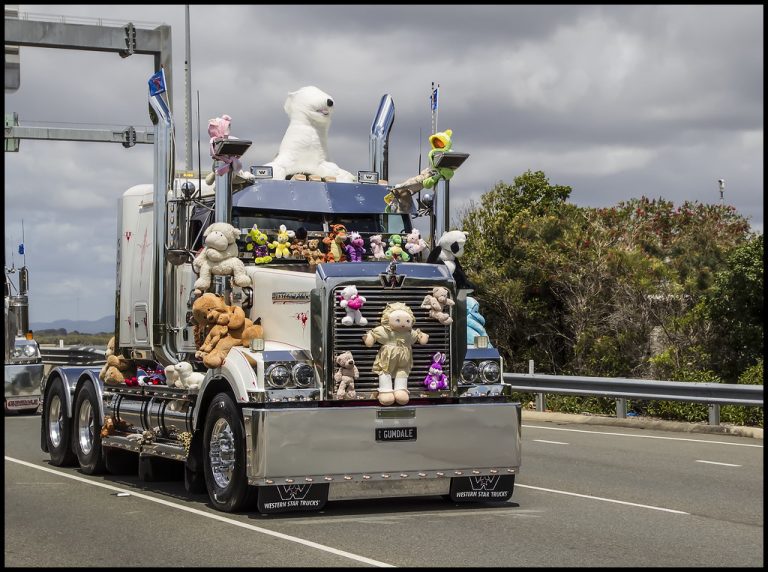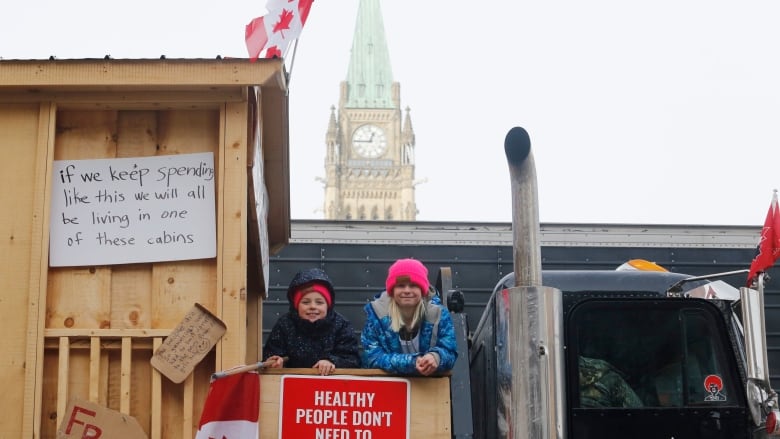
CBC News
Deputy Chief Steve Bell says almost 1/4 of trucks in protest include children

The latest protest developments:
- Ottawa police working with Children’s Aid Society around concerns for children in convoy.
- Mayor says he had constructive discussions with Justin Trudeau and two ministers Tuesday afternoon.
- Ottawa police have made 23 protest-related arrests.
- RCMP say they’re providing around-the-clock support to their municipal counterparts.
- Ohio man facing possible charges for swatting calls to the wrong Ottawa.
- Towing companies on city contracts refusing to move convoy vehicles.
- Some downtown Ottawa residents say they’ve fled their homes.
Ottawa police say almost 25 per cent of the 418 trucks still involved in the ongoing demonstration downtown have children in them, which has hampered the force’s response and led to concerns about the children’s safety.
Police provided an update Tuesday afternoon where Deputy Chief Steve Bell said officers have issued more tickets, made more arrests, and launched dozens more criminal investigations during what they call an “occupation” of the downtown core, now in its 12th day.
As of noon Tuesday, police say they have arrested 23 people and there are currently 85 active criminal investigations. They also released more details on their enforcement of the 10-day interim court injunction against honking horns, saying anyone arrested for contravening the court order who agrees, in writing, that they will abide by the order may be released, while those who refuse to do so may be taken to Ontario Superior Court to face both civil penalties and criminal prosecution.
Bell also turned his focus to the children of protesters. Over the weekend, bouncy castles were set up near Parliament Hill to help entertain the children who remain. Bell said police are working the Children’s Aid Society of Ottawa regarding those children.WATCH | Many trucks in Ottawa have children in them, police say:

Kids in trucks complicate response to Ottawa protest, police say
13 hours agoDuration1:56A large number of children in trucks at the Ottawa protest is complicating the response and police say they’re working with Children’s Aid to ensure their safety. Meanwhile, political division over the protests grows on Parliament Hill. 1:56
“It’s something that greatly concerns us,” Bell said, as first responders are worried about the constant exposure to carbon monoxide, fumes, noise levels and the sanitation of the children.
“We’ll rely on the Children’s Aid Society to help provide and give us guidance around that. We just think it’s an important factor that complicates and makes this an even more challenging operation.”
In a statement to CBC, the society confirmed it is working with Ottawa police and said it has a duty to investigate allegations of abuse and whether a child may need protection.
Parents question police, Children’s Aid assessment
Some protesters CBC spoke to disputed that children are at risk.
“Children are protected by their parents, OK? They’re fine. This is a perfectly peaceful protest,” said Jacob Verellen who travelled to Ottawa from the Chatham-Kent area in southwestern Ontario. He said part of the reason he was at the protest was because of his nephew.
“This is wrong that we’re even suggesting taking children from their parents.”
Cynthia Boutilier travelled to Ottawa from north of Kingston, Ont. with three of her six children last Friday. Even though they brought a trailer with a wood fireplace, she said friends have put them up in a hotel.
While she said the protest has been a great learning experience for her children, she hopes officials are looking out for children.
“We are out here for our children and our children’s future,” she said. “What concerns me more is what is happening to my children and what may happen to them in the future and that is the reason that we’re going to keep them out here, because they’re on the forefront. [They] are the future that we’re fighting for.”

Joanie Pelchat, the Quebec organizer of the Freedom Convoy compared the situation to when families go camping in the summertime with their children.
In an interview with Radio-Canada, she also said there were hundreds of volunteers who support the convoy and had opened their homes to truck drivers and their families, as well as others, like herself, that leave their hotel rooms open for people to shower.
“It’s a big challenge for fuel, even more so now, but we really make sure that our truck drivers aren’t lacking anything, that their children aren’t lacking anything in terms of food, their basic health needs.”
Police facing logistical problems
Police have also run up against many protesters carrying jerry cans into the protest area filled with water, which creates problems for officers who need to stop and conduct searches for those that have fuel, Bell said.
“[This move] identifies a level of sophistication and a level of ability of this group to try and subvert police efforts. That’s concerning to us,” he said.
Bell said police were also looking into a stockpile of fuel located at the camp set up on Coventry Road and officers are trying “to disrupt and deter these people from remaining in our city.”
There have also been active attempts to interfere with police’s ability to remove the vehicles in the downtown core, he said. Some vehicles have wheels removed, or no more brake fluid. The city has also run into issues with some tow truck companies on city contract refusing to remove vehicles from the protest.
The city said Monday it was reviewing those companies’ contracts and looking at possible actions against them, and Bell said police were also looking outside Ottawa to see whether other municipalities could provide support to remove the large trucks.
In a tweet Tuesday afternoon, Mayor Jim Watson said he had constructive discussions with Prime Minister Justin Trudeau, Public Safety Minister Marco Mendicino and Emergency Preparedness Minister Bill Blair about the “ongoing occupation” of the downtown core.
Meanwhile, Trudeau said he reiterated that the federal government will make sure Ottawa has needed resources.
Chief asks for more resources
Bell added one man from from the United States was arrested Monday after calling in fake threats to Ottawa police “designed to deceive and distract” emergency resources.
Local police worked with Ohio police to trace and arrest this individual, he added.
On Monday, Chief Peter Sloly said he needed about 1,800 more personnel to “turn up the heat” and end the protest in the nation’s capital.
Sloly told reporters the new police strategy announced Friday helped make this past weekend’s protest smaller compared to the previous weekend. He said police are currently making incremental progress toward ending the demonstration, but more help would end it quicker.
Police began raiding protest camps over the weekend, seizing fuel and making more arrests linked to protest activity.
Ottawa Mayor Jim Watson said Monday that requests will go to both federal and provincial governments for more officers to help out.
City council made its own moves Monday as residents demand action. Council wants to increase fines to $1,000 for various violations, including noise, blocking roads, open fires, and idling vehicles throughout the state of emergency — and do away with the rule that allows a vehicle to idle when it’s cold outside.